Can high inflation in the US bring an end to the China-US trade war?
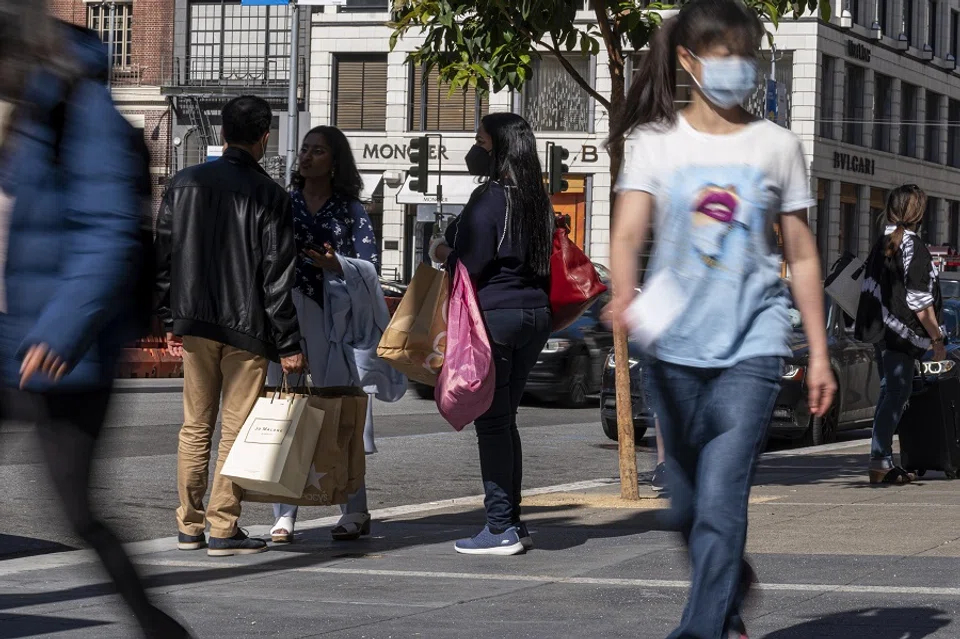
US inflation is at a 40-year high, posing a threat to the Biden administration's position in the midterm elections in November. On 10 May, President Joe Biden said that inflation is his "top domestic priority" and that he is considering lowering or removing some of the punitive tariffs that the Trump administration had imposed on Chinese imports, to lower the price of goods in the US. This implies that the four-year-long China-US trade war could come to an end.
Academics interviewed for this report believe that Biden is not keen to maintain a tariff war with China, and that the country's high inflation has presented the US with the best opportunity to end the trade war. The Democrats can now justifiably remove some tariffs and end the protracted lose-lose situation between China and the US without being accused of being weak towards China.
Over the past four years, mainstream US public opinion and the bipartisan Congress have come to a consensus on containing China. Since taking office early last year, Biden has essentially continued Trump policies on trade with China and maintained the punitive trade war tariffs of 7.5% to 25% on US$370 billion worth of Chinese imports. Biden even said at a press conference in January that the US was "not there yet" in terms of lifting these tariffs.
Based on statistics released by the US Department of Commerce's Census Bureau in February, the past year's goods-only deficit with China widened to 14.5%, reaching US$355.3 billion, the largest deficit since 2018, when it reached US$418.2 billion. At the same time, China has only completed about 60% of its commitment to buy US$200 billion worth of additional US goods and services over the past two years, which means that it failed to meet its committed purchase under the phase one trade deal that was signed in January 2020.
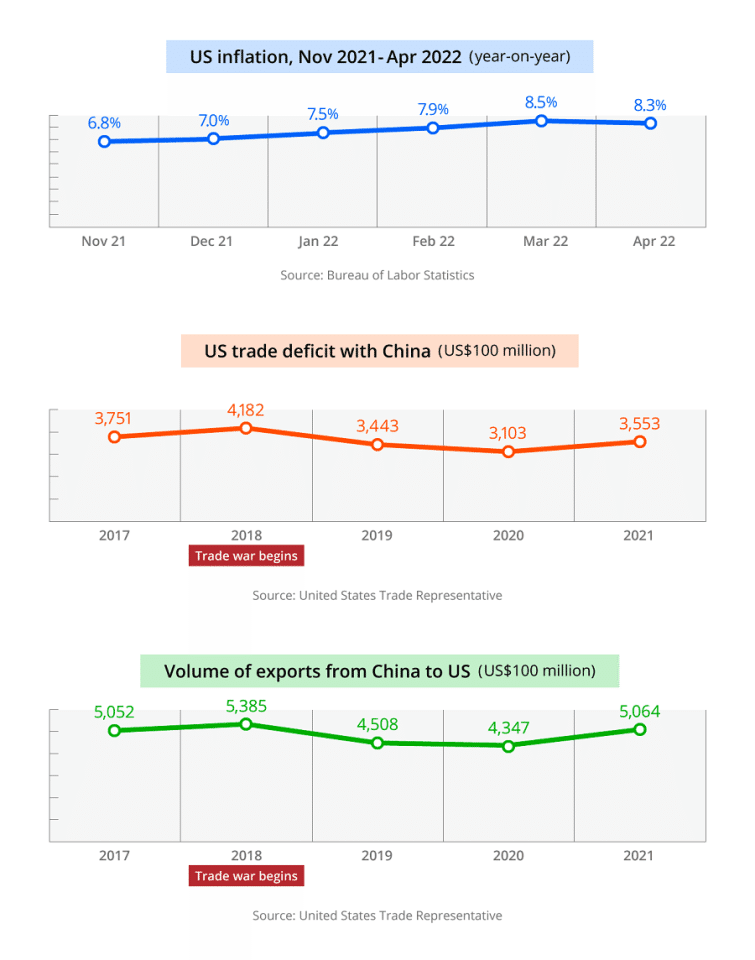
Top US trade officials have expressed their dissatisfaction with China, stating that their patience is "wearing thin" and even threatening to take action against China. This led to the outside world speculating whether trade tensions between the two countries would escalate to a new high.
... the US's current high inflation is a combination of both demand-pull and cost-push inflation. - Professor Chen Yongjun, Renmin Business School
Inflation a big blow to Biden's approval ratings
During the same period, inflation in the US has been surging for months due to strong consumer demand, persistent supply chain bottlenecks, rising wages and an ultra-loose monetary policy. Following the outbreak of the Russia-Ukraine war in February, which dealt a big blow to energy and food prices, the US's Consumer Price Index reached a record high of 8.5% in March compared with a year earlier, the sharpest year-on-year increase since 1981. This has dealt a big blow to Biden's approval ratings.
Professor Chen Yongjun of Renmin Business School told the China News Agency that the US's current high inflation is a combination of both demand-pull and cost-push inflation.
Chen pointed out that the cost-push inflation was triggered by increased tariffs on Chinese imports and the corresponding price increases of goods during the Trump era. On the other hand, Biden released massive Covid relief funds during the pandemic, leading to a devaluation of the US currency and a boost to consumer demand and purchasing power. However, the supply of goods did not increase, so prices were pushed up.
It was not until March this year that the Office of the United States Trade Representative announced that it would reinstate tariff exemptions for 352 Chinese products, including industrial components, automotive parts and consumer goods until the end of 2022.
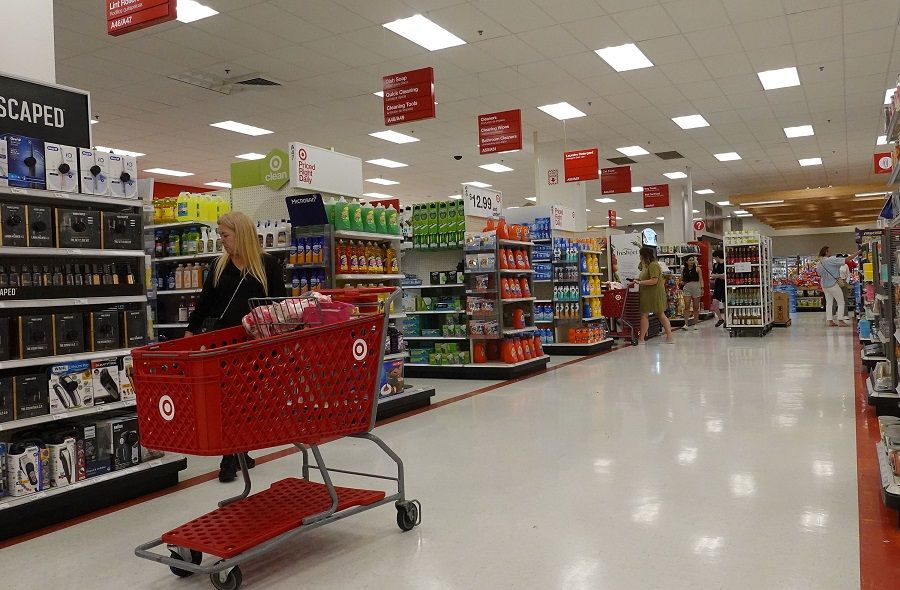
Associate Professor Fu Fangjian of the Lee Kong Chian School of Business at Singapore Management University told Zaobao that the Biden administration actually consulted with US businesses before announcing the tariff exemptions in March.
Fu said that the Republican Party has always seen Trump's brazen trade war with China as one of his main political achievements. While Biden is not keen on maintaining the tariff war with China, he has been reluctant to remove the tariffs as he would risk the Republicans and voters labelling him as "giving in to China".
While they doubt that this would be a game changer in terms of taming high inflation, economists in and outside of the White House agree that this is one of the main measures that could effectively cut costs.
Removing tariffs a choice?
Key officials in the Biden administration have also recently begun to soften their positions on trade with China.
US Treasury Secretary Janet Yellen and deputy national security adviser for international economics Daleep Singh both said in April that the US would take a closer look at the country's trade strategy with China and could lower the tariffs imposed on non-strategic Chinese goods such as bicycles and apparel to help combat inflation. While they doubt that this would be a game changer in terms of taming high inflation, economists in and outside of the White House agree that this is one of the main measures that could effectively cut costs.
Biden also said on 10 May that they were "looking at what would have the most positive impact" and that "no decision has been made on it" yet. Former White House press secretary Jen Psaki told the media that there could be more tariff-related news in the "coming weeks".
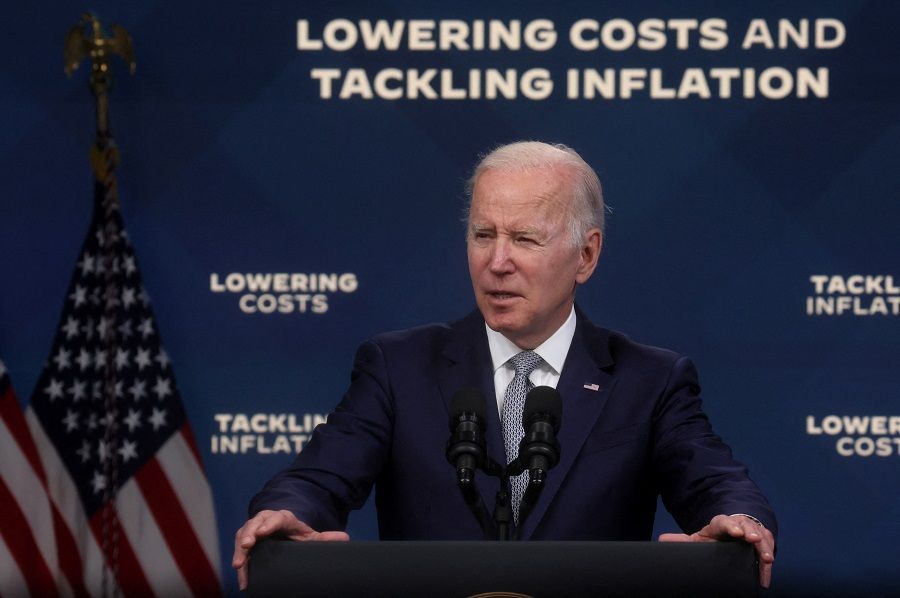
Professor Chen Bo, director of the Optical Valley Institute for Free Trade, told Zaobao that the Biden administration has clearly underestimated the long-term effects of inflation and may be left with no choice but to adjust its trade relations with China.
He said that high inflation has already become the US's "biggest political problem" but at the same time presents the White House with the opportunity to de-escalate the trade war. By lifting tariffs on non-sensitive Chinese consumer goods in the name of combating inflation, Biden's "political pressure would be brought to a minimum" and the move would be more easily accepted by bipartisan Congress and Americans.
Apart from high inflation, Associate Professor Li Mingjiang of the S. Rajaratnam School of International Studies at Nanyang Technological University told Zaobao that Biden also faces the pressure of negative public opinion on China. According to an opinion poll released in April by the Coalition for a Prosperous America, a non-profit organisation that also supports "Made in America", most respondents are in favour of imposing additional tariffs on China.
But Li believes that by lifting some tariffs on Chinese goods to ease inflation and gain favour in the election, Biden will also be able to avoid the criticism from the Republicans for being soft on China, which will affect his approval ratings.
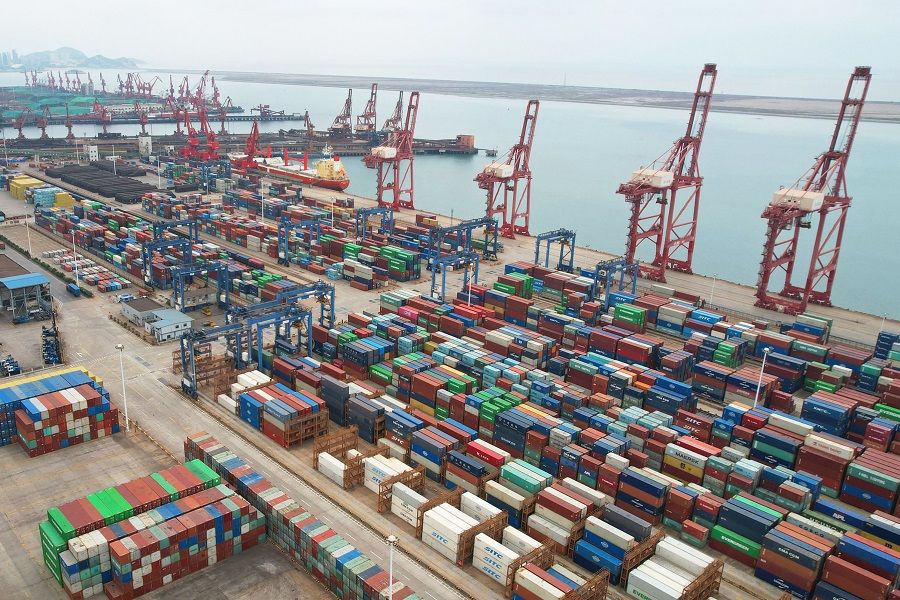
The former Trump administration delivered three rounds of tariffs between June 2018 and August 2019, involving US$50 billion, US$200 billion and US$120 billion worth of Chinese imports respectively. Two of these actions that imposed 25% tariffs on US$50 billion worth of Chinese goods every year will expire on 6 July and 23 August respectively.
... the US will not remove the punitive tariffs on Chinese products that the White House considers to be related to national security and having a significant impact on the US's domestic industry. - Professor Chen Bo, Director, Optical Valley Institute for Free Trade
New round of negotiations?
On 3 May, the US began its review of the additional tariffs imposed on Chinese goods, implying the possibility of a new round of negotiations between China and the US.
Professor Chen Bo believes that the Biden administration could remove or significantly lower the second and third rounds of punitive tariffs involving about US$300 billion worth of Chinese goods, including consumer goods and goods that US enterprises rely more heavily on, such as industrial components, parts and intermediary parts.
However, he predicts that the US will not remove the punitive tariffs on Chinese products that the White House considers to be related to national security and having a significant impact on the US's domestic industry. This includes the earliest batch of the US$50 billion worth of Chinese imports hit by additional tariffs, which involves steel products, chemical products, solar panels and so on. These products are heavily subsidised by the Chinese government, which the US deem as an unfair trade practice.
At the same time, the US may also request China to lift most of the additional tariffs imposed on US$110 billion worth of US goods. Fu believes that China could show some goodwill when the time comes and follow through with a tariff reduction on US exports into China.
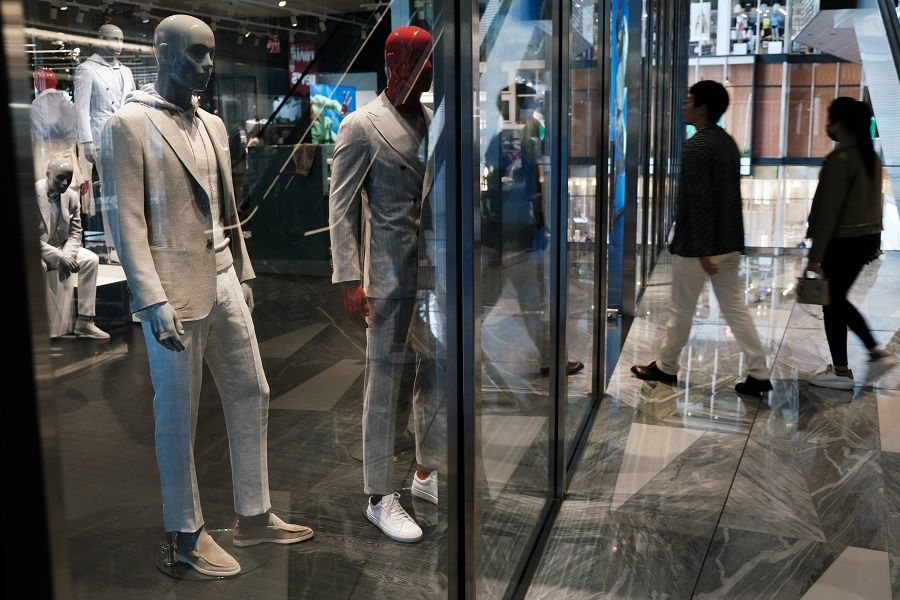
Wang Jiangyu, a professor at the City University of Hong Kong School of Law and the director of the Centre for Chinese and Comparative Law, said that since the signing of the phase one trade deal, the China-US trade war has in fact become a domestic issue for the US; China basically has not made any moves, it has neither lifted the additional tariffs on US goods into China nor initiated any opposition against the US in this area.
Recently, China's diplomats have ramped up its calls to persuade the US to remove the tariffs. In an interview with Forbes in late April, Chinese ambassador to the US Qin Gang called on the US government to reconsider lifting the additional tariffs on China, citing that the tariffs have cost American companies US$1.7 trillion, while increasing US household spending by US$1,300 annually.
... fundamentally there is an even stronger desire [in China] to stabilise foreign relations, especially with the US and the West, to better seize opportunities for strategic economic growth. - Associate Professor Li Mingjiang, S. Rajaratnam School of International Studies at Nanyang Technological University
Qin also defended China, saying that China "has done so much" and fulfilled all its time-bound obligations of the phase one trade deal. He also warned, "If the US side still wants to continue [the trade war], I don't know if they are prepared for more losses... China will have to deal with it too."
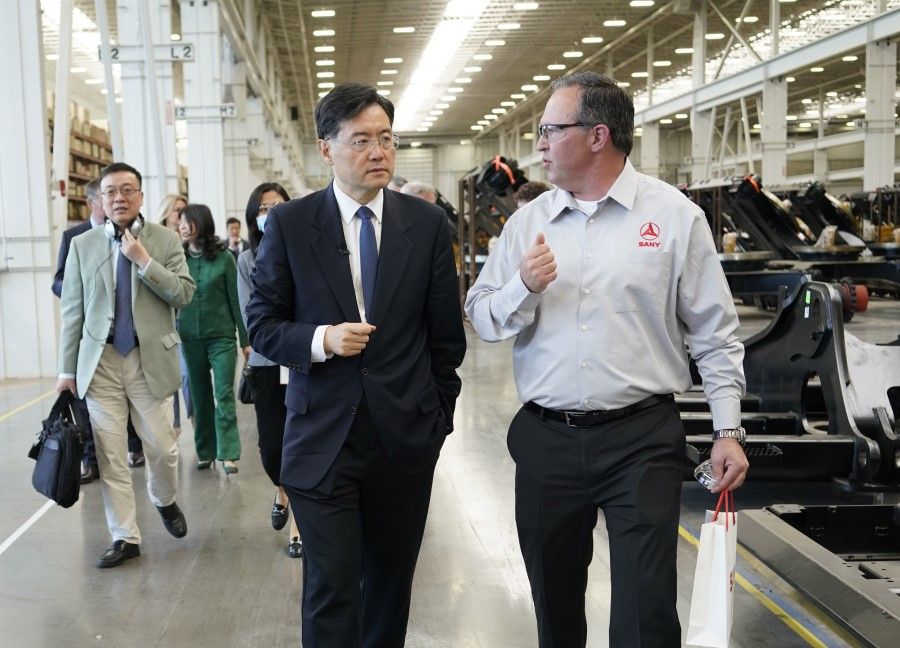
Associate Professor Li felt that while there are currently a lot of hawkish policy discussions among the Chinese authorities that show the resolve to tussle with the US, fundamentally there is an even stronger desire to stabilise foreign relations, especially with the US and the West, to better seize opportunities for strategic economic growth.
Li stated, "Particularly in the past few years, after so much confrontation and conflict, China's desire in this area might be stronger, amid bigger domestic economic pressure."
Tech war with China unlikely to change
As for whether lifting tariffs will be an opportunity for improved China-US relations, Li believes that the trade war is a major challenge for China-US relations. If the US makes some positive changes, it will help to "stabilise overall China-US relations to some extent, and also create the condition for China and the US to engage in more dialogue to address differences in economy and trade".
Professor Wang thinks that even if the US lifts some tariffs, this does not signal US's amiability towards China. Intense confrontation between China and the US is firmly in place, and the US is stepping up economic blockades and sanctions on China in other sectors, hoping to stop technology transfer to China and technology cooperation between both countries. "There is no basis for improvement of China-US relations," he added.
This month, the US has once again put its diplomatic focus on China. Secretary of State Antony Blinken was scheduled to speak on 5 May about the Biden administration's policy towards China, but this was postponed as he tested positive for Covid-19. Blinken is expected to give the China speech this week. The US has also signalled that it might step up human rights discussions and escalate the China-US technology war.
Bloomberg quoted informed sources who revealed that the White House is considering unprecedented sanctions on Chinese technology company Hikvision, which had previously been blacklisted in 2019, for human rights violations against Muslims in Xinjiang, and adding the company to its Specially Designated Nationals and Blocked Persons List, which could restrict the company's global operations.
Lifting or lowering tariffs would only be for the sake of domestic elections, and not to adjust its China policy or improve relations with China. - Associate Professor Li Mingjiang, S. Rajaratnam School of International Studies at Nanyang Technological University
The sanctions are also a sign that the US is using its leading position in the global financial system to hit Chinese companies, adding to the tension in China-US relations.
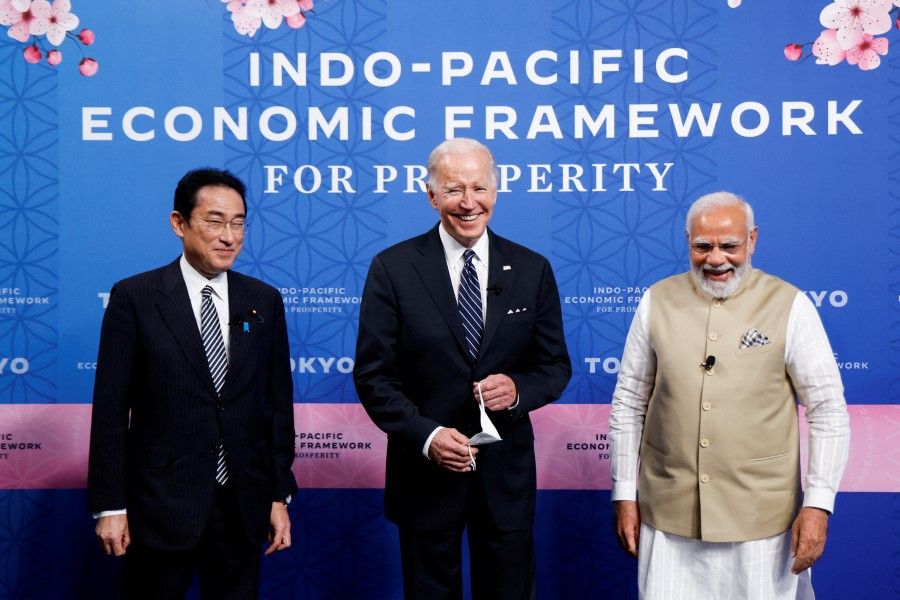
Associate Professor Li said that the core and foundation of Biden's China policy is fixed, which is to engage in strategic competition with China. Lifting or lowering tariffs would only be for the sake of domestic elections, and not to adjust its China policy or improve relations with China. "It is unlikely that there will be any adjustments in terms of the tech war with China," he stated.
Li highlighted that in the year or so since Biden took office, the sanctions on Chinese companies have been stricter than during the Trump administration. He predicts that with the midterm elections entering a critical period in the next few months, Biden may take more confrontational measures against China in some areas and ramp up sanctions on Chinese companies, in order to account to voters.
Associate Professor Fu believes that Biden will no longer battle against China over tariffs. He said, "The US has jumped in and knows that it will not work against China, so it will not engage with China there."
... easing the trade war will not only be good for the US economy, but will also help the White House to ramp up its containment and impact against China, and get the West to follow along in ideological issues such as human rights and democracy. - Professor Chen Bo, Director, Optical Valley Institute for Free Trade
However, the Biden administration will shift the tussle with China to other areas where it feels that it has the advantage, while continuing to urge its Asia Pacific allies to apply collective pressure on China. The US may also continue to "choke" China in chip supplies, to slow down China's development.
Professor Chen Bo also said that easing the trade war will not only be good for the US economy, but will also help the White House to ramp up its containment and impact against China, and get the West to follow along in ideological issues such as human rights and democracy. He said, "That way, there will be no awkward situation like the trade war, whereby allies observe from the sidelines as China and the US fight."
Differences in opinion in White House
Biden is currently facing rare division and intense debate within the White House, and it will not be a smooth path to removing tariffs.
Just this week, Reuters quoted informed sources saying that Yellen is one of the officials who want to remove some of the tariffs, but US Trade Representative Katherine Tai wants to keep them in place to develop a more strategic China trade agenda that protects US jobs and respond to China's behaviour in global markets, which could even include imposing new strategic tariffs.
Associate Professor Li said that Biden's key officials hold various opinions, which reflects the different stands and interests of official agencies. Yellen as the secretary of the treasury, would be happy with lower inflation, as that would put her under "less policy pressure". Whereas Tai as the trade representative, would seek policy strategy interests and hope to "use tariffs and other economic measures that the US uses to pressure China as political bargaining tools."
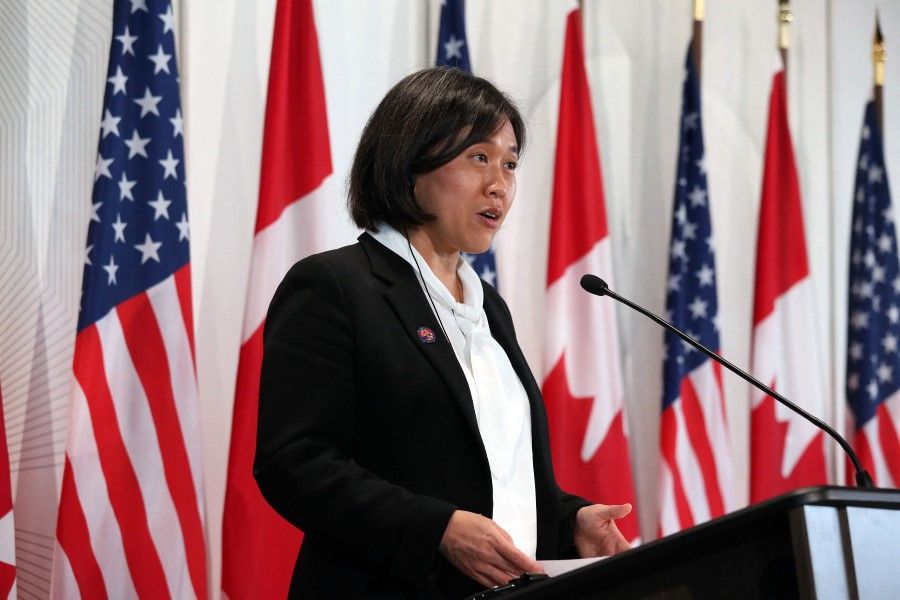
But Li notes that recently, there are increasing calls to remove or reduce tariffs on China, and high inflation is also a key factor that would determine the midterm elections, so it is probable that Biden will eventually remove or reduce tariffs.
China's economy is currently facing enormous downward pressure, so it will not act irrationally on US exports or intentionally retaliate against the US in that manner. - Associate Professor Fu Fangjian, Lee Kong Chian School of Business at Singapore Management University
China cannot go along with Russia in draining the US
Some analyses claim that Russia is currently planning a long-term war of attrition in Ukraine, and looking to turn the tables on the US and the West by ruining them with high inflation in retaliation for imposing sanctions on Russia.
With "no limits" to China-Russia relations, will China just go along with Russia? Professor Wang feels this is an economic conspiracy theory, and bringing down the West through high inflation is just a pipe dream.
He said that China also needs to consider its own interests, including continuing to integrate into the international economic system and not decoupling from the West, while expanding exports. "Because exports impact China's foreign exchange income and the livelihoods of many people, it cannot go along with Russia," he stressed.
Associate Professor Fu also believes that China's economy is currently facing enormous downward pressure, so it will not act irrationally on US exports or intentionally retaliate against the US in that manner.
He added, "If China does that, it would be as silly as Trump, because while pushing up US inflation, its own factories would close and many people would be out of a job, which might hit China harder than the US."
Related: Why Biden will continue the trade war with China to the 'end' | The politicisation of China-US trade ties: Showdown between capitalism and communism? | Geopolitics is the biggest threat to China-US relations, not trade or tech wars | Dual circulation strategy revisited: China deepens integration with the global economy
